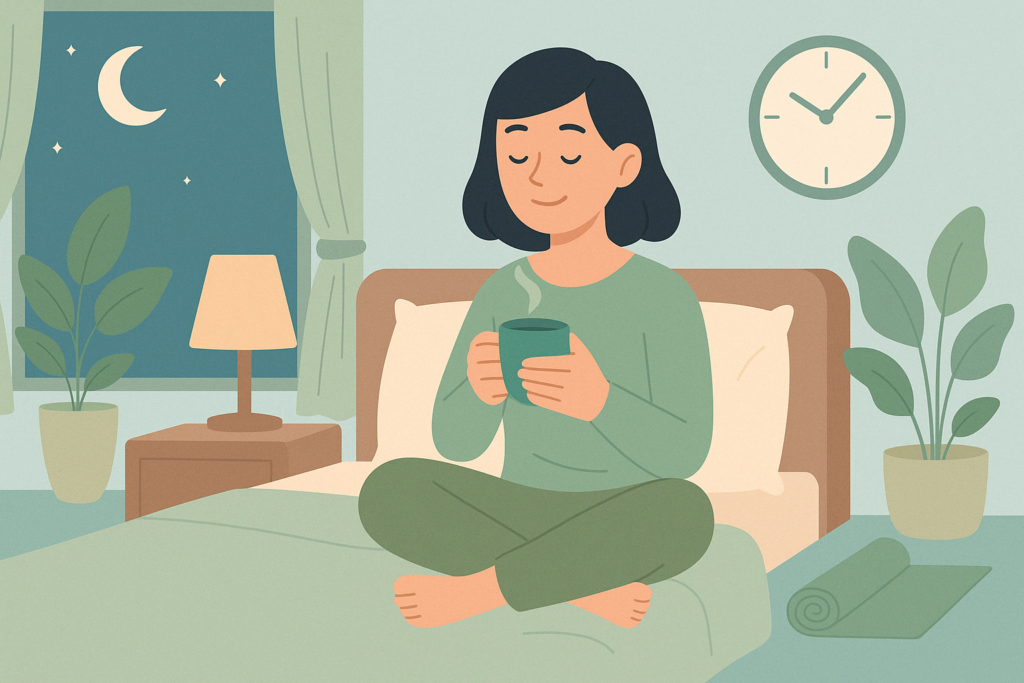If you’re wondering how to fix your sleep schedule, you’re not alone. Especially if anxiety makes nights harder, you know you need better rest.
But the harder you force it, the harder it feels to fall asleep.
The truth?
Fixing your sleep schedule isn’t just about earlier bedtimes.
It’s about resetting your nervous system, retraining your circadian rhythm, and creating emotional safety before sleep.
In this guide, we’ll break down:
- Why anxious minds resist sleep routines
- How to fix your sleep schedule without strict rules
- Emotional and physical steps for resetting your sleep naturally
🔗 Fact: According to WebMD, poor sleep can be triggered by various factors such as stress, medical conditions, mental health disorders, and lifestyle habits. Understanding these causes is key to improving both your sleep and overall well-being.
Why Anxiety Makes It Hard to Fix Your Sleep Schedule?
When you’re anxious, your body produces high levels of cortisol, the stress hormone that tells your brain:
“Stay alert, something’s wrong!”
Cortisol delays melatonin production, which explains:
- Overthinking at bedtime
- Racing heart at night
- Waking up wired at 3 AM
That’s why fixing your sleep schedule requires more than discipline. It requires calming the mind first.
How to Fix Sleep Schedule Without Forcing It?
1️⃣ Anchor Your Wake-Up Time — No Matter When You Slept
Most people think you have to fix your bedtime first.
Wrong.
The fastest way to fix your sleep schedule is to wake up at the same time every morning, even if you barely slept.
🕰 Light exposure between 6 AM–9 AM resets circadian rhythm naturally.

2️⃣ Create a Gentle Emotional Wind-Down Routine
Instead of a rigid bedtime checklist, focus on:
- Journaling intrusive thoughts
- Stretching and deep breathing
- Listening to soft sounds (rain, ocean waves)
- Dimming all lights 90 minutes before the intended sleep time
This tells your body: “It’s safe to slow down.”
3️⃣ Stop Saying “I Must Sleep Now” — It Makes It Worse
The more you pressure yourself to sleep, the more adrenaline your body produces.
Instead, reframe:
🌙 “I’m creating the right conditions for sleep to happen naturally.”
4️⃣ Avoid a Weekend Sleep Schedule Ruin
Late weekend wake-ups sabotage your circadian rhythm even if you get “more sleep.”
✅ Tip: Stay within a 1-hour wake window every day — yes, even on weekends.
5️⃣ Be Patient — It Takes 5–10 Days to Reset Sleep Naturally
Most bodies need 5–10 consistent days of:
- Morning light
- Evening decompression
- Emotional unwinding
Before the sleep drive resets.
Trust the process, not the clock.
🔁 5-Day Gentle Sleep Reset Plan
| Day | Key Action |
|---|---|
| Day 1 | Fix wake-up time + sunlight exposure |
| Day 2 | Reduce caffeine intake after 12 PM |
| Day 3 | Emotional journaling before bed |
| Day 4 | 30-minute screen detox before sleeping |
| Day 5 | Stick to morning/evening anchors |
Check If You Need a Sleep Reset: Take the Test
If you’re still struggling to figure out how to fix your sleep schedule naturally,
Take the Sleep Quality Test:
- Quick 2-minute reflection
- Personalized recommendations
- No pressure, just insights
🧠 Take the Sleep Test →
🔗 Related SoulBot Reads
- Signs Your Sleep Struggles Are Affecting Your Mental Health
- 5 Causes of Bad Sleep (And How to Fix Them)
- Why You’re Always Tired (Even After 8 Hours of Sleep)
Final Thought: Sleep Isn’t a Command — It’s an Invitation
You don’t “force” sleep. You create the right environment, and invite it back. Healing sleep means healing the space between tired and safe.
🌙 Take the Sleep Test →
or
📞 Book a Free Consultation with SoulBot to talk with a therapist who understands emotional sleep struggles.
🙋♀️ FAQ: How to Fix Sleep Schedule
- How many days does it take to fix a sleep schedule?
Typically, 5–10 consistent days if you anchor your wake-up times and decompress emotionally.
2. Can anxiety permanently damage my sleep cycle?
No. Sleep cycles are plastic — they can always be rebuilt with support from the nervous system and consistent routines.
3. What’s the best way to reset sleep rhythm without melatonin?
Sunlight exposure, emotional safety rituals, consistent wake times, and sensory decompression before bed.



